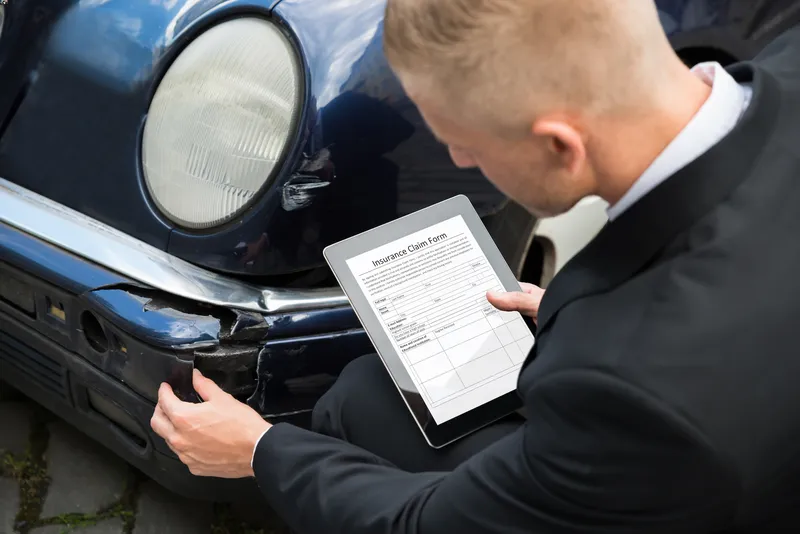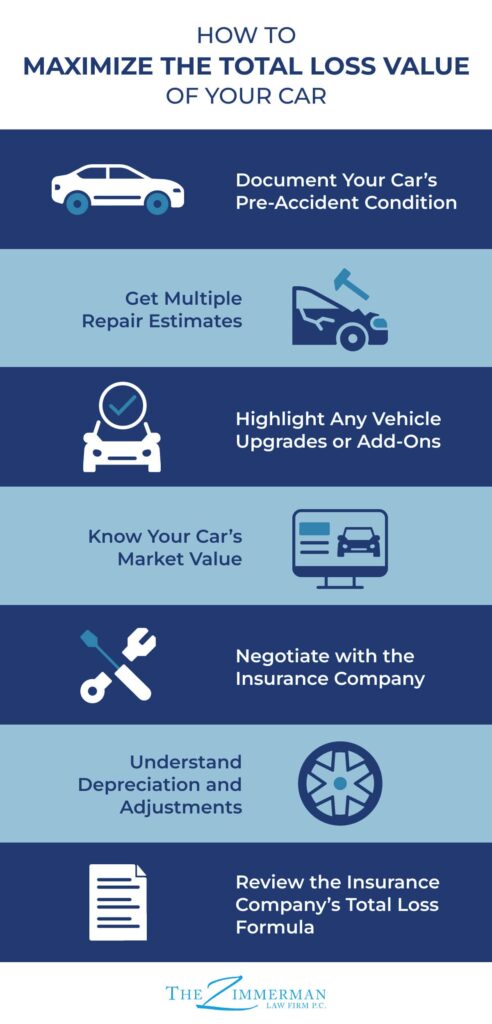 Accidentes de tráfico
Accidentes de tráfico
Si ha sufrido recientemente un accidente de tráfico, es posible que esté en conversaciones con el perito del seguro sobre los daños sufridos por su vehículo.
Es posible que el perito de seguros utilice frases como "calculadora del valor total del coche" o "calculadora de siniestro total".
La compañía de seguros calcula el valor total del coche para determinar si se trata de un siniestro total y, a sus ojos, no merece la pena repararlo.
How Insurance Companies Value Totaled Vehicles

When your vehicle is deemed a total loss after a car accident, the next step is determining its value. Insurance companies follow a specific process to calculate the amount they’ll offer for your totaled vehicle, and understanding how they do it can help ensure you’re getting a fair settlement.
What Is a Total Loss?
A vehicle is considered a total loss when the cost to repair it exceeds its total car value. Insurance adjusters will assess the damage and compare the repair costs to the car’s actual market value before the accident. If repairs are more expensive than the car’s value, the vehicle is “totaled,” and the insurance company will offer compensation based on its valuation.
The Role of Actual Cash Value (ACV)
To determine the value of your totaled vehicle, insurance companies typically use the Actual Cash Value (ACV) method. ACV is calculated by taking the replacement cost of the vehicle and subtracting depreciation. This means that the insurance company doesn’t pay for the full price of a new car but rather its value at the time of the accident.
Depreciation accounts for factors like the car’s age, mileage, and condition. A car that’s several years old with high mileage will naturally have a lower ACV than a newer car with fewer miles.
Factors That Affect Your Vehicle’s Value
Several factors influence the ACV calculation and the final settlement offer. These include:
- Vehicle Make and Model: The brand, model, and year of your vehicle play a significant role in determining its market value. Popular vehicles with higher resale values often have higher payouts.
- Mileage: The more miles a vehicle has, the more wear and tear it has experienced. High-mileage cars typically have lower ACVs compared to low-mileage vehicles in similar condition.
- Condition: Insurance adjusters will assess your vehicle’s overall condition before the accident. A car that is well-maintained with minimal cosmetic or mechanical issues will have a higher total car value than one that is in poor condition.
- Market Demand: The demand for vehicles similar to yours in your area also affects its value. For example, if your car is a popular make and model in your region, it may command a higher value in the market.
- Aftermarket Modifications: If you’ve made modifications to your car, such as installing a new stereo system or custom rims, these may add value to your vehicle. However, insurance companies typically only offer compensation for modifications that were professionally installed and documented.
How Insurance Adjusters Use Valuation Tools
Insurance companies use several tools to help determine your vehicle’s pre-accident value. Commonly, they’ll reference:
- Kelley Blue Book (KBB) and NADA: These are two of the most widely used sources for car values. KBB provides estimates based on a variety of factors, including condition and mileage, while NADA focuses more on wholesale prices.
- Local Market Data: Adjusters may also research the prices of similar cars in your area. If there’s a limited supply of cars like yours locally, it could result in a higher valuation.
- Professional Appraisals: In some cases, adjusters may also rely on professional appraisers to assess the value of a car, especially when determining the fair market value is more complex due to vehicle condition or unique circumstances.
What Happens After the Valuation?
Once the adjuster has calculated the ACV of your totaled car, they’ll offer you a settlement based on that amount. The insurance company will deduct your policy’s deductible from this settlement offer. For example, if your car’s ACV is $10,000 and your deductible is $500, the insurance company will pay you $9,500.
If you’re not satisfied with the valuation or feel it’s too low, you have the right to dispute it. You can use tools like a total car value calculator or provide evidence like independent appraisals, maintenance records, and photos of your vehicle before the accident. We’ll explore how to dispute a settlement offer in the next section.
Appealing a Totaled Vehicle Valuation
If you believe the insurance company’s valuation of your totaled vehicle is too low, you have the right to challenge it. Insurance companies may not always offer the fair market value of your car, especially if they undervalue key factors like the car’s condition or market demand. Fortunately, there are steps you can take to appeal the valuation and potentially increase your settlement.
1. Review Your Insurance Policy
Start by reviewing your insurance policy to understand your coverage and any terms related to the valuation of a totaled vehicle. Look for clauses regarding Actual Cash Value (ACV), Total Loss Valuation, and Dispute Resolution. This will help you determine if the insurance company followed the terms of your policy when making their offer.
2. Gather Supporting Documentation
To support your appeal, you’ll need to present evidence that demonstrates the true value of your vehicle. Here’s what you can gather to make your case:
- Independent Appraisals: Consider hiring an independent appraiser to provide a professional assessment of your vehicle’s market value before the accident. An independent appraisal can carry significant weight in the appeal process, especially if it provides a higher value than the insurance company’s estimate.
- Maintenance Records: If you’ve kept detailed maintenance records showing that your vehicle was well-maintained, this can help demonstrate that your car was in better condition than the insurance company’s assessment suggests.
- Photos of the Vehicle: Provide clear photos of your vehicle taken before the accident. These photos should show that the car was in good condition, highlighting aspects like the exterior, interior, and any recent upgrades or repairs.
- Comparable Vehicles: Research the current market and provide listings of similar vehicles in your area. If you find cars of the same make, model, year, and condition being sold at a higher price, this can be used as evidence to justify a higher valuation for your vehicle.
3. Submit a Formal Appeal to the Insurance Company
Once you’ve gathered your documentation, submit a formal appeal to the insurance company. This can usually be done in writing or by filling out an appeal form if one is provided. Make sure to:
- Clearly state that you’re appealing the valuation of your totaled vehicle.
- Include a detailed explanation of why the valuation is too low, referencing the evidence you’ve collected.
- Provide a suggested settlement amount based on your research and documentation.
4. Negotiate with the Adjuster
After submitting your appeal, the insurance company may offer to re-evaluate their valuation. In some cases, they may come back with a revised offer that better reflects the true value of your vehicle. Be prepared to negotiate with the adjuster. If they present a higher valuation, but it’s still lower than what you believe is fair, don’t be afraid to push for a higher settlement.
5. Seek Help from a Lawyer or Appraiser
If your appeal is denied or you’re unable to reach a satisfactory agreement, you may want to seek professional help. A lawyer who handles insurance disputes can assist with your case, providing guidance on the best steps to take and helping you negotiate with the insurance company.
Alternatively, working with an appraiser can provide additional evidence to support your appeal. In some cases, the insurance company may be more willing to adjust their offer once presented with expert testimony.
6. Consider Alternative Dispute Resolution
If the negotiation process doesn’t lead to a satisfactory outcome, you may have the option to pursue alternative dispute resolution (ADR), such as mediation or arbitration. ADR methods allow both parties to work with a neutral third party to reach a resolution without going to court. This can often be a faster and less expensive option than litigation.
7. Take Legal Action if Necessary
If all else fails and you are unable to resolve the dispute, you may consider taking legal action. A lawsuit could be necessary if the insurance company refuses to settle or continues to undervalue your vehicle despite the supporting evidence you’ve provided.
Calculadora del valor total del coche

Por lo general, en Texas, cuando el coste de reparación del vehículo supera el valor real en efectivo del vehículo (ACV) la compañía de seguros comprará su coche por el valor justo de mercado en lugar de repararlo.
En otras palabras, si el coste total de las reparaciones es superior al ACV, la compañía de seguros considera que se trata de un siniestro total y da el coche por siniestro total.
Por ejemplo, si el coste de reparación de su vehículo dañado es de 10.000 $, pero el valor justo de mercado es de sólo 5.000 $, la compañía de seguros le dará un total del vehículo.
El Código de Transporte de Texas proporciona la fórmula y las directrices por las que se calcula el valor total del coche.
¿Qué puedo recuperar si mi coche no está destrozado?
Si su vehículo no es un siniestro total y puede repararse, aún puede reclamar el valor disminuido del coche, además del coste de las reparaciones.
El valor disminuido es la diferencia entre el valor justo de mercado de su coche antes y después del accidente.
¿Cómo puedo determinar el valor reducido de mi coche?
Normalmente, cada compañía de seguros tiene su propia fórmula para determinar el valor disminuido de un vehículo, pero existen unas directrices generales que deben seguir.
Bajo la ley de Texas, varios factores afectan el valor disminuido de un coche, incluyendo:
- Extensión del daño,
- Coste de las reparaciones,
- Calidad de las reparaciones efectuadas,
- Tendencias pasadas y futuras del mercado,
- Historial de accidentes anteriores, y
- Coste de un vehículo similar sin historial de accidentes.
La forma de calcular el valor disminuido de un coche siniestrado dependerá de factores específicos de su vehículo, los daños sufridos y la calidad de las reparaciones.
Para determinar si puede tener una reclamación por disminución del valor, póngase en contacto con los abogados del bufete Zimmerman Law Firm.
¿Tendré derecho a reclamar por pérdida de valor si alquilo mi coche?
Generally, if you lease your car you cannot file a diminished value claim because you are not the owner of the car.
Sin embargo, hay raras excepciones, y su capacidad para recuperar dependerá en gran medida de la redacción exacta de su contrato de arrendamiento y del arrendador individual.
En ocasiones, el arrendador permite que el arrendatario (usted) presente una reclamación por pérdida de valor.
Si usted tiene un contrato de arrendamiento, su accidente de coche disminución de valor reclamación se determinará de la misma manera que si usted era dueño del coche.
Trabajar con una compañía de seguros después de haber sufrido un accidente de coche puede llevar mucho tiempo y ser engorroso.
Tanto si se enfrenta a un siniestro total como a una reclamación de valor disminuido, lo mejor es consultar a un abogado con experiencia.
Contact The Zimmerman Law Firm for a 100% Free Case Review
Si usted ha estado recientemente en un accidente automovilístico, póngase en contacto con el bufete de abogados Zimmerman para una consulta gratuita.
Si usted se está preguntando cómo el accidente de coche calculadora de valor disminuido afectará a su reclamo o no está seguro de si su coche es total, podemos ayudar.
Tenemos años de experiencia en la entrega de resultados positivos a nuestros clientes de accidentes de coche. Póngase en contacto con nosotros hoy para empezar.
Nuestra oficina de Waco, Texas


